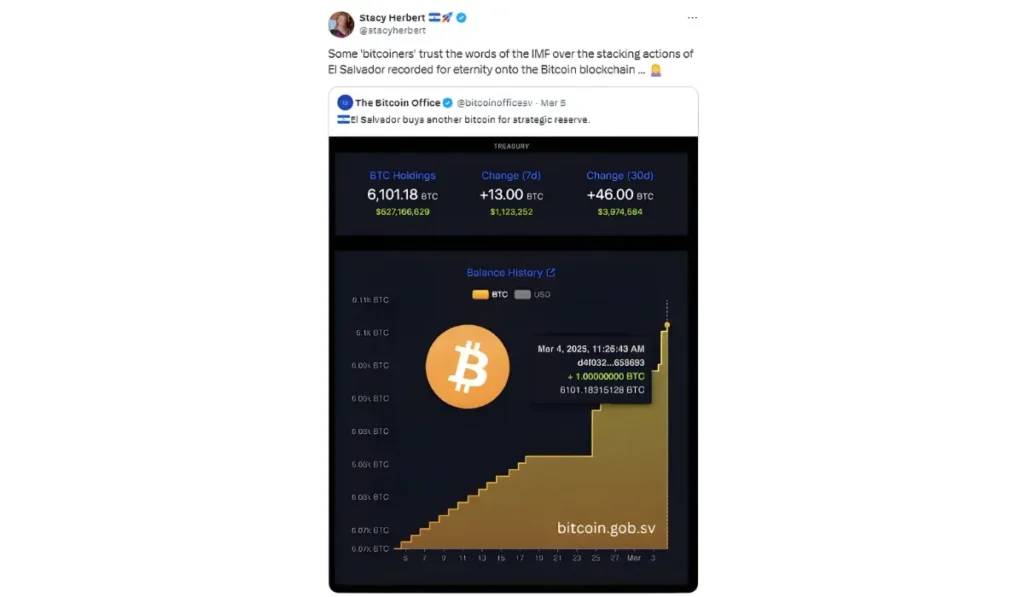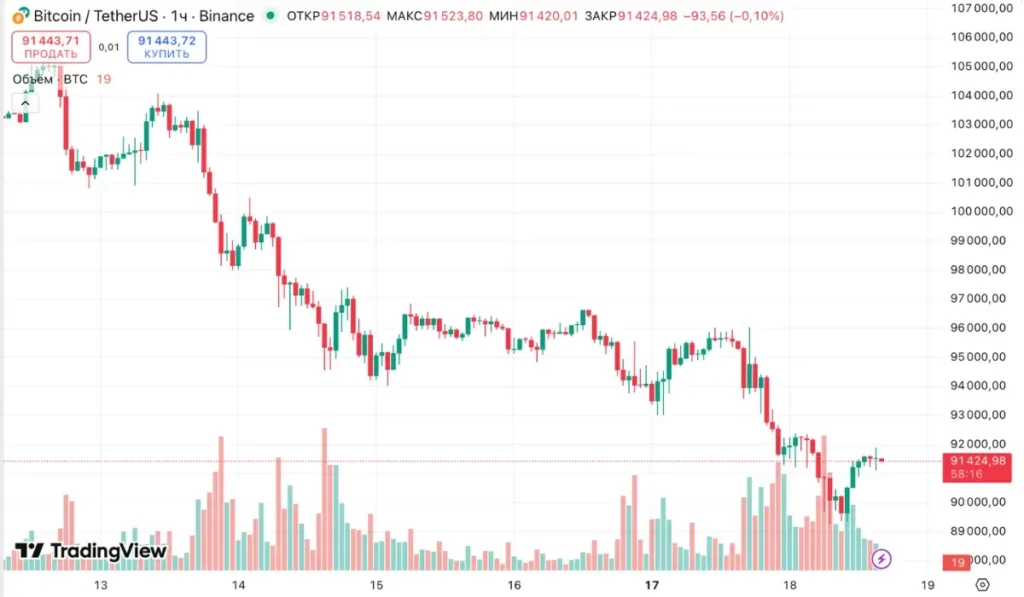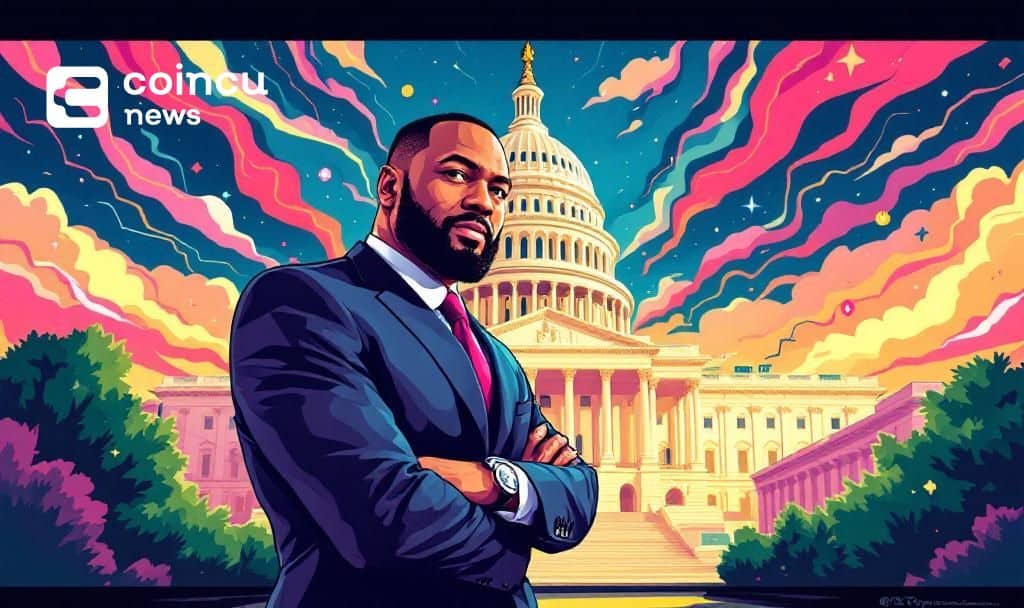El Salvador “Buys The Dip”, Adds 1098 BTC To Growing National Bitcoin Treasury
Key Takeaways
- El Salvador’s Bitcoin Office reported that it has purchased 1098 BTC for nearly $100 million over the past week. This includes 1,091 BTC bought on Monday, the single largest transaction made by the country since November 2022.
- The latest purchase brings the Central American nation’s total bitcoin holdings to 7,474 BTC, valued at approximately $676 million. This also contrasts with El Salvador’s $1.4 billion loan agreement with the IMF, which prohibits government acquisitions.
- IMF officials wrote in a recent report that El Salvador had not purchased any new Bitcoin since February 2025, and the additions reflect consolidation across wallets controlled by different government agencies.
- Bitwise’s European head of research, Andre Dragosch, said that continued bitcoin accumulation by sovereign nations like El Salvador and the Czech Republic could signal a potential shift in global financial strategies.
El Salvador is steadfast in maintaining its bitcoin accumulation strategy. Amid a decline that saw the apex crypto’s price drop below the $90,000 mark for the first time since April 2025, the Central American nation added 1098 BTC, worth nearly $100 million, to its coffers over the past week.
On Tuesday, President Nayib Bukele posted a screenshot on X showing the government’s bitcoin holdings, which have increased to 7,474 BTC, valued at roughly $676 million. The country has been consistently buying 1 BTC daily since the President first announced the move in November 2022.
El Salvador Makes Largest Daily Bitcoin Purchase, the Country’s Bitcoin Treasury Now Holds 7,474 BTC, Valued at $676 Million
According to data from El Salvador’s Bitcoin Office, the government purchased a total of 1,098 BTC over the past week, which includes the largest single-day purchase of 1,091 BTC and ongoing daily acquisitions.
Historically, El Salvador has continued to buy Bitcoin even during market downturns, reflecting a long-term strategy aimed at enhancing the country’s national reserves. However, the purchase conflicts with the government’s loan agreement with the International Monetary Fund (IMF). The $1.4 billion funding deal from December 2024 explicitly prohibits the public sector from using or accumulating any bitcoin.
In July, two IMF officials confirmed that the country had not bought any Bitcoin since February. An official report by the bank suggested that the increase in El Salvador’s holdings reflects consolidation across various government wallets, indicating that these were not fresh purchases from the open market.
Stacy Herbert, director of El Salvador’s Bitcoin Office and co-host of the Orange Pill podcast, previously declared that the country will not stop its bitcoin treasury strategy, despite the IMF deal. In March, she wrote in an X post that people are trusting the IMF’s empty words over El Salvador’s on-chain transactions.

She said that bitcoin is the “opposite of government control” and President Bukele embraced it as legal tender in September 2022, “not to consolidate power, but to distribute it”. Stacy previously described bitcoin as “freedom, transparency, and individual empowerment”.
Czech Republic Central Bank Adds $1 Million in Bitcoin, USD Stablecoins, and Tokenized Deposits to Digital Asset Treasury
El Salvador’s latest addition came days after the Czech National Bank (CNB) announced a $1 million digital asset treasury purchase. According to the central bank, its “test portfolio,” offering first direct exposure to cryptocurrencies, includes bitcoin, a tokenized bank deposit, and USD-pegged stablecoins.
The transaction, which was made outside of the bank’s international reserves, is aimed at providing it with practical experience in handling crypto assets rather than an indication of a shift in its policy direction or reserve strategy.
CNB governor Ales Michl said the central bank started its “test pilot” in early 2025 to explore how decentralized digital currencies may complement traditional asset holdings. The initiative was approved by the bank’s board on October 30, following an internal review that concluded that crypto assets are growing in demand among institutional portfolios worldwide.
Michl noted that the project’s goal is to test the processes involved in managing digital assets, from custody and private key management to security and Anti-Money Laundering (AML) compliance. The bank vows to share its findings over the next two to three years.
The central bank has clarified that its bitcoin and crypto purchases will not affect its EUR €140 billion foreign reserves, as the $1 million allocation shields it from crypto market volatility.
The CNB will study how blockchain technology influences payments, settlement, and accountability, while its technical team will test wallet operations, multi-sig controls, and on-chain audit procedures.
Each token in the CNB’s digital asset reserve serves a distinct purpose, with bitcoin representing decentralized value, stablecoins providing fiat-backed stability, and the tokenized deposit acting as a bridge to regulated financial markets.
Michl reiterated that the Czech koruna will remain the country’s legal tender, but the central bank wants to prepare for the digital age by embracing new forms of money and investments.
Bitwise Analyst Suggests Nation-State Bitcoin Adoption Could Signal a Shift in Global Monetary Policies
Digital asset manager and ETF issuer Bitwise’s European head of research, Andre Dragosch, argued that the trend of sovereign nations buying the dip could signal a potential shift in global financial strategies.
Bitcoin is currently trading in the $90,000 – $91,000 range, with the drawdown from the $100,000 mark triggered by panic selling among short-term holders (STHs).
 Source – TradingView
Source – TradingView
These wallets have been holding the asset for less than three months and were in a loss, resulting in 148,000 BTC being sold in what has become the largest liquidation event since April 2025.
While El Salvador’s $100 million bitcoin buy provides a much-needed relief in the short term, it was overshadowed by a broader de-risking event. The market is now testing if long-term holders (LTHs) will absorb the selling pressure to buy bitcoin from the open market at discounted prices.
At the time of writing, Bitcoin (BTC) is trading at $91,456 – down 4.37% in 24 hours.
The post El Salvador “Buys The Dip”, Adds 1098 BTC To Growing National Bitcoin Treasury appeared first on BiteMyCoin.
You May Also Like

Tim Scott Pushes for Crypto Bill Vote in Senate Committee
Solana ETF BSOL Logs Over $580M in Inflows in Three Weeks, Bitwise CEO Says
